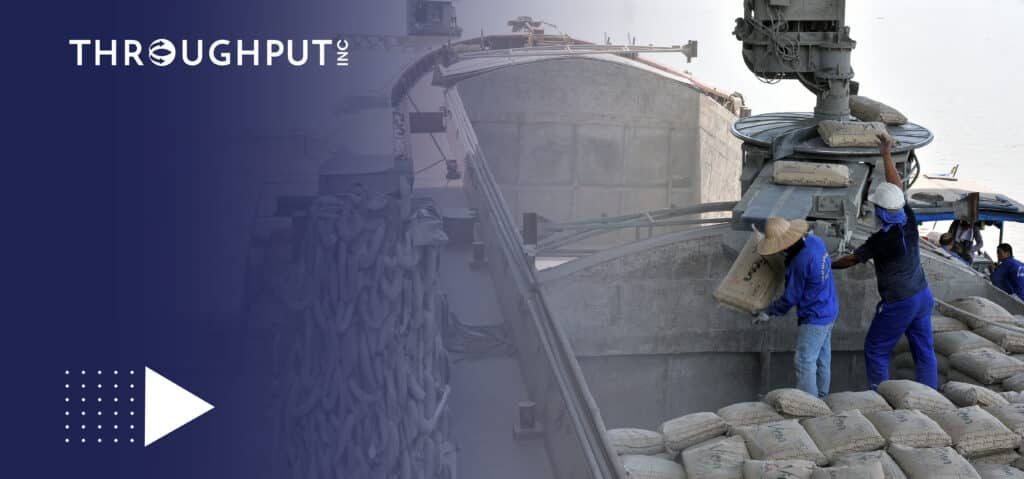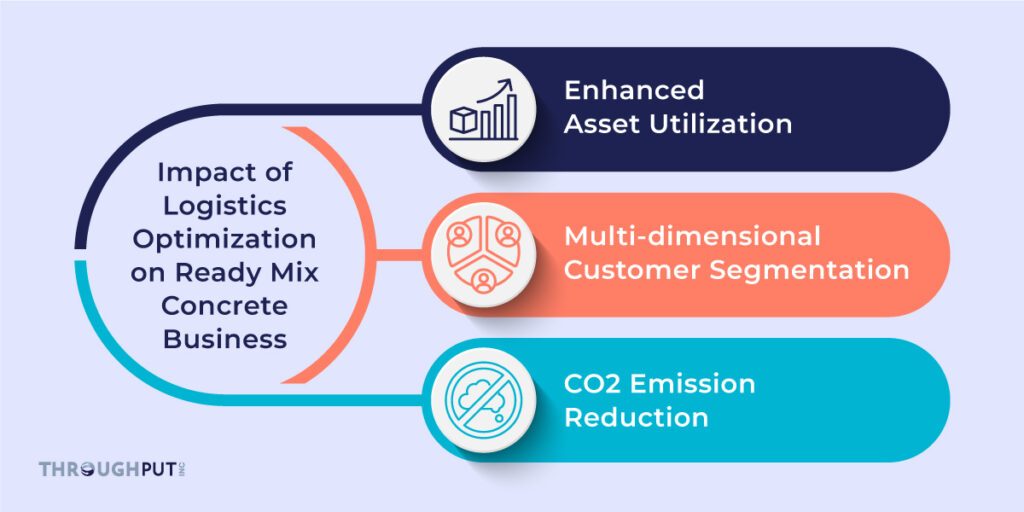Navigating the Complexities of Ready Mix Concrete Logistics: A Case Study with ThroughPut

Logistics presents a formidable challenge in the ready mix concrete (RMC) industry.
For obvious reasons!
RMC is not just any building material; it’s inherently time-sensitive. Unlike cement industry challenges, once mixed, RMC must be delivered and used within a narrow window to preserve its quality and integrity. This critical time frame shapes the entire ready mix concrete logistics.
- The transportation of ready mix concrete has to take place in specialized mixer trucks. These trucks need to maintain the right speed and agitation to keep the concrete in its usable form.
- The distance between the batching plant and the construction site is a significant factor. Longer distances can lead to issues with setting time.
- Regular maintenance of the mixer trucks is essential. Breakdowns can cause significant delays and financial losses.
- Sudden changes in construction schedules or last-minute orders can be challenging to accommodate.
- Urban areas can pose challenges in terms of traffic, leading to delays. Access to remote or congested construction sites can also be problematic.
For ready mix concrete manufacturers, managing logistics effectively is crucial. It not only impacts supply chain efficiency, but also customer satisfaction and revenue.
This was evident in our work with an RMC manufacturer grappling with these very issues. To facilitate their growth and align with their commitment to environmental responsibility, they sought to optimize their logistics network while also aiming to reduce CO2 emissions.
Let’s explore how ThroughPut spearheaded this transformation.
Challenges Of Ready Mix Concrete Logistics
Our client faced several common industry challenges, like the ones mentioned above.
The foremost was ensuring timely delivery due to concrete’s limited lifespan. They had to juggle numerous variables like distance, traffic, and site access to optimize routes for timely delivery, making ready mix concrete logistics an extremely complex permutation.
Secondly, coordinating customer needs, plant capacity, and transport resources was also vital. This required seamless communication and transparency between customers, suppliers, drivers, and dispatchers.
Thirdly, the availability and deployment of the fleet had to match fluctuating demand of a rapidly growing business.
Given all the challenges, the RMC manufacturer had clear goals that they wished to achieve:
Supply Chain Visibility
They needed detailed, real-time insights into their operations. This included understanding truck routes, analyzing material sourcing from plants, identifying potential new plant locations, and evaluating delivery inefficiencies and carbon emissions.
Better Customer Segmentation
They wanted to segment customers based on various KPIs like volume and frequency for efficient delivery planning and fulfilling demands.
Control Carbon Dioxide Emission
Committed to sustainability, they sought immediate operational measures to cut carbon emissions and waste.

Implementing AI-driven Strategies to Optimize Ready Mix Concrete Logistics
The ready mix concrete business leveraged ThroughPut’s multi-level framework to enhance its operational goals and sustainability.
At a high level, the business optimized its focus areas using insights from ThroughPut. They engaged ThroughPut’s customer segmentation capabilities to categorize customers based on the frequency and value of business they were receiving from each of them. This allowed the company to prioritize those customers and services that aligned with their operational capabilities, sustainability goals and profitability.
At the mid-level, the RMC manufacturer concentrated on the key drivers to optimize network design. The emphasis was on achieving complete visibility of material flow and enhancing On-Time In-Full (OTIF) deliveries and travel times.
ThroughPut provided this level of insight for more efficient allocation of resources, better route planning, and a reduction in unnecessary travel, directly impacting both efficiency and environmental footprint.
At the granular or tactical level, they closely monitored and analyzed daily trips. This approach helped in pinpointing areas where asset utilization could be enhanced and CO2 emissions minimized.
By scrutinizing data like travel times, return journeys, on-site durations, and customer recall rates, ThroughPut’s AI provided actionable insights to improve truck dispatches to the nearest plant, reduce return travel times, and identify potential locations for new plants closer to high-volume customers.
The Impact of Strategic Logistics Optimization on RMC Business

Enhanced Asset Utilization
The AI-driven insights from ThroughPut enabled the company to significantly improve asset utilization. By analyzing key metrics like travel time, return travel, and time spent on-site, the company was able to make data-driven decisions.
These included reallocating deliveries, adjusting customer priorities, and enhancing plant-to-customer demand allocation. This resulted in a measurable reduction in the number of trips per truck per day, yielding a ripple effect of efficiency across the network.
Multi-dimensional Customer Segmentation
ThroughPut’s advanced segmentation strategies helped in re-prioritizing deliveries based on comprehensive customer scorecards. These scorecards included metrics like job numbers, sales volume, load size, and distance to plants.
Customers were categorized into different tiers, each receiving tailored service levels. This approach not only streamlined operations but also fostered stronger customer relationships by aligning delivery capabilities with customer expectations.
Carbon Dioxide Emission Reduction
A pivotal outcome of ThroughPut’s optimization was a substantial reduction in CO2 emissions. By reallocating plants and re-prioritizing deliveries, operational zones became more defined, leading to efficient plant pairings.
The analysis of trip data allowed for a reduction in total number of trips, idle time, and overall active time. This recalibration of operations led to significant environmental benefits, showcasing ThroughPut’s commitment to sustainability alongside operational excellence.
Unlock the Potential of Enhanced Ready Mix Concrete Logistics
The experience of the RMC manufacturer with ThroughPut underscores the significance of efficient logistics in the industry. Through careful optimization of their logistics, the company achieved notable improvements in truck utilization and reduced idle times, leading to more streamlined operations.
This strategic approach not only improved operational efficiency but also contributed to environmental sustainability through reduced carbon dioxide emissions and waste. These efforts align with the increasing global emphasis on ecological responsibility, showcasing how operational changes can have a broader positive impact.
Furthermore, the manufacturer saw improvements in production efficiency and overall business performance. This case highlights that employing tools like ThroughPut in the Ready Mix Concrete industry can be essential in refining logistics, enhancing material flow, and aligning production with demand.
